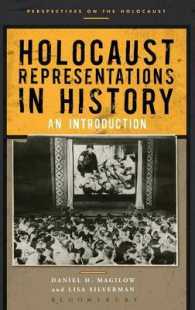- ホーム
- > 洋書
- > 英文書
- > Politics / International Relations
Full Description
Political science is an intensely quantitative discipline, and models are central. Political scientists use models--formal and informal, statistical and qualitative--to investigate and illuminate causal mechanisms, generate comparative data, and understand the conditions under which certain outcomes are expected to occur. But even though the use of models has grown dramatically in the discipline, there is very little understanding among political scientists of the role or function that models play in the scientific enterprise more generally. Moreover, theoretical models and empirical models have traditionally been treated as separate (hence the division between theorists and empiricists). Today, however, the emphasis is on using models to generate testable predictions that serve as hypotheses for subsequent data analysis. But how do we justify and rationalize the method? Why test predictions from a deductive, and thus truth-preserving, system?
David Primo and Kevin Clarke tackle these central questions in this novel work of methodology. They argue that the lack of a suitable justification for model testing is not the only reason to revisit the role of models in political science. Most importantly, they contend that models should be seen as 'objects' and thus neither true nor false. Rather, they should be evaluated in the same fashion as models are evaluated in the physical sciences--good models are useful for particular purposes. Nothing more, nothing less. Divided into two parts, the book first establishes that no social scientific endeavor is philosophy-free. The second part focuses on different types of models, and closes with a framework for integrating theoretical and statistical models.
Contents
Preface ; 1 A Model Discipline ; 1.1 The Model in Political Science ; 1.2 Metaphors and Analogies, Fables and Fictions ; 1.3 The broad themes of the book ; 1.3.1 Science is not what we think it is ; 1.3.2 Current practice is not "philosophy-free" ; 1.3.3 Models are objects ; 1.3.4 Models are not tested with data ; 1.3.5 Explanation ; 1.4 Plan of the Book ; 1.5 What this Book is Not ; 2 The Science in Political Science ; 2.1 Introduction ; 2.2 What Political Scientists Say They Are Doing ; 2.3 Hypothetico-Deductivism ; 2.4 Problems with H-D ; 2.4.1 Deductions are Truth-Preserving ; 2.4.2 Data Can't Speak for Themselves ; 2.4.3 Other Problems with H-D ; 2.5 How We Got Here ; 2.5.1 Logical Positivism ; 2.5.2 Pathologies of Rational Choice ; 2.5.3 Methods and Models ; 2.5.4 The Empirical Implications of Theoretical Models ; 2.6 Conclusion ; 3 What is a Model? ; 3.1 Introduction ; 3.2 Models as Maps ; 3.3 A Few Examples ; 3.4 The Received View of Scientific Theories ; 3.5 The Semantic Conception of Scientific Theories ; 3.6 The Model-Based View of Scientific Theories ; 3.7 Models and Theories ; 3.8 Conclusion ; 4 Theoretical Models ; 4.1 Introduction ; 4.2 Aspects of Theoretical Models ; 4.3 The Purposes of Models ; 4.3.1 Foundational Models ; 4.3.2 Organizational Models ; 4.3.3 Exploratory Models ; 4.3.4 Predictive Models ; 4.4 Judging a Theoretical Model ; 4.4.1 Prediction is the Wrong Standard (Usually) ; 4.4.2 The Illusion of Precise Standards ; 4.4.3 Dimensions of Usefulness ; 4.5 Conclusion ; 5 Empirical Models ; 5.1 Introduction ; 5.2 What is an Empirical Model? ; 5.2.1 A Model-Based Understanding ; 5.3 The Purposes of Empirical Models ; 5.4 The Illogic of Theory Testing ; 5.4.1 Falsificationism ; 5.4.2 Verificationism ; 5.4.3 Bayesian Confirmation ; 5.5 The Other Uses of Empirical Modeling ; 5.6 Conclusion ; 6 Explanation ; 6.1 Introduction ; 6.2 Existing justifications ; 6.3 Explanation ; 6.3.1 What constitutes an explanation? ; 6.3.2 Explanation in Political Science ; 6.4 Models as explanations ; 6.5 Choosing among explanations ; 6.5.1 Comparative Model Testing ; 6.5.2 Is choosing necessary? ; 6.6 Conclusion ; 7 Conclusion ; 7.1 Introduction ; 7.2 Review of the argument ; 7.3 Issues and counterarguments ; Bibliography







